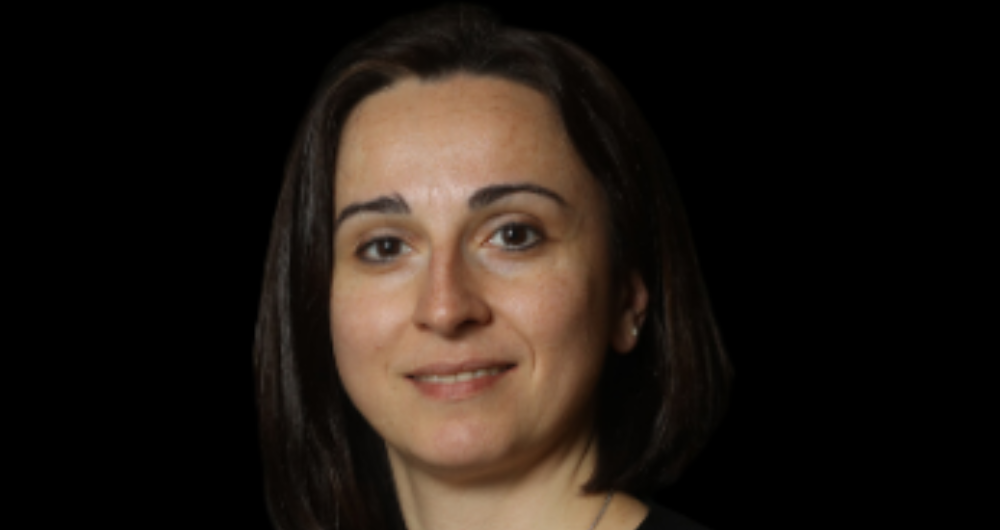
Alessandra Mileo is Associate Professor and Principal Investigator at the Insight Research Ireland Centre for Data Analytics, Dublin City University. She holds an MSC and a PhD in Computer Science from the University of Milan. Her academic journey has brought her to the flourishing field of neurosymbolic AI. It’s hybrid, cross-cutting research of the type that Prof Mileo has pursued since her early days studying computer science in Italy.
After completing a PhD in formal logic and AI at the University of Milan, Alessandra Mileo moved into a post doc position in statistical modelling, also in Milan. It was big change from the theoretical approach of the PhD and the beginning of a career habit of drawing very disparate areas of AI research together.
‘The project lab was using sensors and it was a huge change and very challenging one for me,’ says Prof Mileo. ‘It was my first real experience of the hybrid AI that is developing rapidly today.’
Her new, applied research focused on supporting decision-making in assisted living and health.
The next career development was a move to Galway – and unusual one for an Italian, she says. ‘Italians don’t move abroad,’ she says. ‘We get too homesick.’
But move she did, taking up a role at the DERI Institute, which would later become part of Insight. It was 2010, post-crash, and investment in research in Italy was stagnant, she says.
Prof Mileo secured a role as PI in a smart city project funded under the EU FP7 programme, which was a useful combination of the theoretical and applied skills she had attained in Italy. ‘It was right up my alley, a mix of sensors, continuous decision making and knowledge engineering. I had funding to hire people and my career kicked off.’
When the Science Foundation Ireland (now Research Ireland) Centres Programme commenced, The Insight Centre was established and a new position in DCU opened up. Prof Mileo, just finishing maternity leave, applied for a permanent academic position.
‘I moved into the field of media analytics. It was brand new again. Another reinvention!’
The hype around machine learning was beginning to grow and Prof Mileo was interested in a holistic approach to AI – not just the numbers, not just the knowledge, but both and with the human in between.
‘This hybrid approach evolved to become part of a series of methods we now call neurosymbolic AI,’ she explains. ‘This is the combination of symbolic AI; the rule-based, logical AI that I studied during my PhD; and the neural AI that has developed along with large scale data capture and increased computational resources.’
‘Symbolic AI uses knowledge and mathematical logic to mimic cognitive reasoning and is transparent in that you can trace back all the “logical” steps going from premises to conclusions. However, it doesn’t scale and it can’t easily adapt to the nuances of the real world. Neural models – which can learn and process huge amounts of information – are not explainable. Neurosymbolic AI looks at ways to combine both approaches so that we can get the best of both worlds.’
Around this time more European research support was being directed towards Explainable AI and Trustworthy AI so the timing was good for Prof Mileo.
‘I started to build up a research agenda around neurosymbolic AI. Within INSIGHT, I co-led a research group focused on decision making with Prof Ken Brown in UCC where I got exposure to other aspects of Explainable AI research and began developing my work in combining neural and symbolic AI for the greater good of humans.’
The work brought her to her latest funding achievement, a Research Ireland Frontiers for Future award to develop explainable AI techniques supporting medical decision making applied to cardiology, specifically for early diagnosis of cardiomyopathies.
‘Medical screening is a high stakes activity that can be enhanced by AI, but it must have human expertise in the mix. We must be able to understand and explain the decisions that AI makes when screening for disease, for both ethical and regulatory reasons’ she says.
‘Cardiomyopathies are difficult to diagnose because of their complexity, and the adoption of AI could help if clinicians had a way to understand the outcome via explanations. Combining the two approaches to AI we can achieve better and more accountable screening outcomes.’
The project is personal for Prof Mileo because her father died from a genetic cardiomyopathy. ‘Dad was still alive when I first started applying for funding for this project,’ she says. ‘It took me three attempts to get it.’
The field of neurosymbolic AI is blossoming right now and Prof Mileo says that being part of the Insight Research Ireland Centre for Data Analytics has helped to her to take advantage of all the expertise that is growing around it, especially when it comes to neural networks and their advances in computer vision and language processing.
‘I have had to reinvent myself so many times – I couldn’t have done it without access to the wide range of expertise that is available at the Centre,’ she says. ‘I couldn’t have formulated my ideas with out the input of all these different experts that I worked with through the Research Challenge and the Centre network.
‘In Milan, when I switched to statistics and wasn’t familiar with the field, I found it hard to access expertise I could draw on. In Insight it was all available, a gamechanger really. The support from the operations team is amazing – if I wasn’t in Insight and I needed help with HR or EPE, I wouldn’t know who to ask. The EPE has been a particularly nice surprise – I’ve had so many opportunities through initiatives such as Pint of Science, Soapbox Science and Dublin maker.
‘I feel like everything I do is much more impactful and I have visibility. People outside of my immediate research community come to me because I am an Insight researcher.’